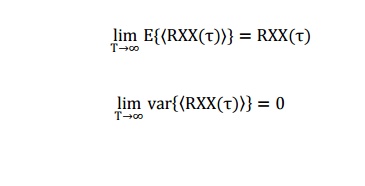Chapter: Communication Theory : Random Process
Ergodic Process
ERGODIC PROCESS:
In the
event that the distributions and statistics are not available we can avail
ourselves of the time averages from the particular sample function. The mean of
the sample function Xλo(t) is referred to as the sample mean of the process
X(t) and is defined as

This
quantity is actually a random-variable by itself because its value depends on
the parameter sample function over it was calculated. the sample variance of
the random process is defined as

The
time-averaged sample ACF is obtained via the relation is

These
quantities are in general not the same as the ensemble averages described
before. A random process X(t) is said to be ergodic in the mean, i.e.,
first-order ergodic if the mean of sample average asymptotically approaches the
ensemble mean

In a
similar sense a random process X(t) is said to be ergodic in the ACF, i.e,
second-order ergodic if

The
concept of ergodicity is also significant from a measurement perspective
because in Practical situations we do not have access to all the sample
realizations of a random process. We therefore have to be content in these
situations with the time-averages that we obtain from a single realization.
Ergodic processes are signals for which measurements based on a single sample
function are sufficient to determine the ensemble statistics. Random signal for
which this property does not hold are referred to as non-ergodic processes. As
before the Gaussian random signal is an exception where strict sense ergodicity
implies wide sense ergodicity.
Related Topics